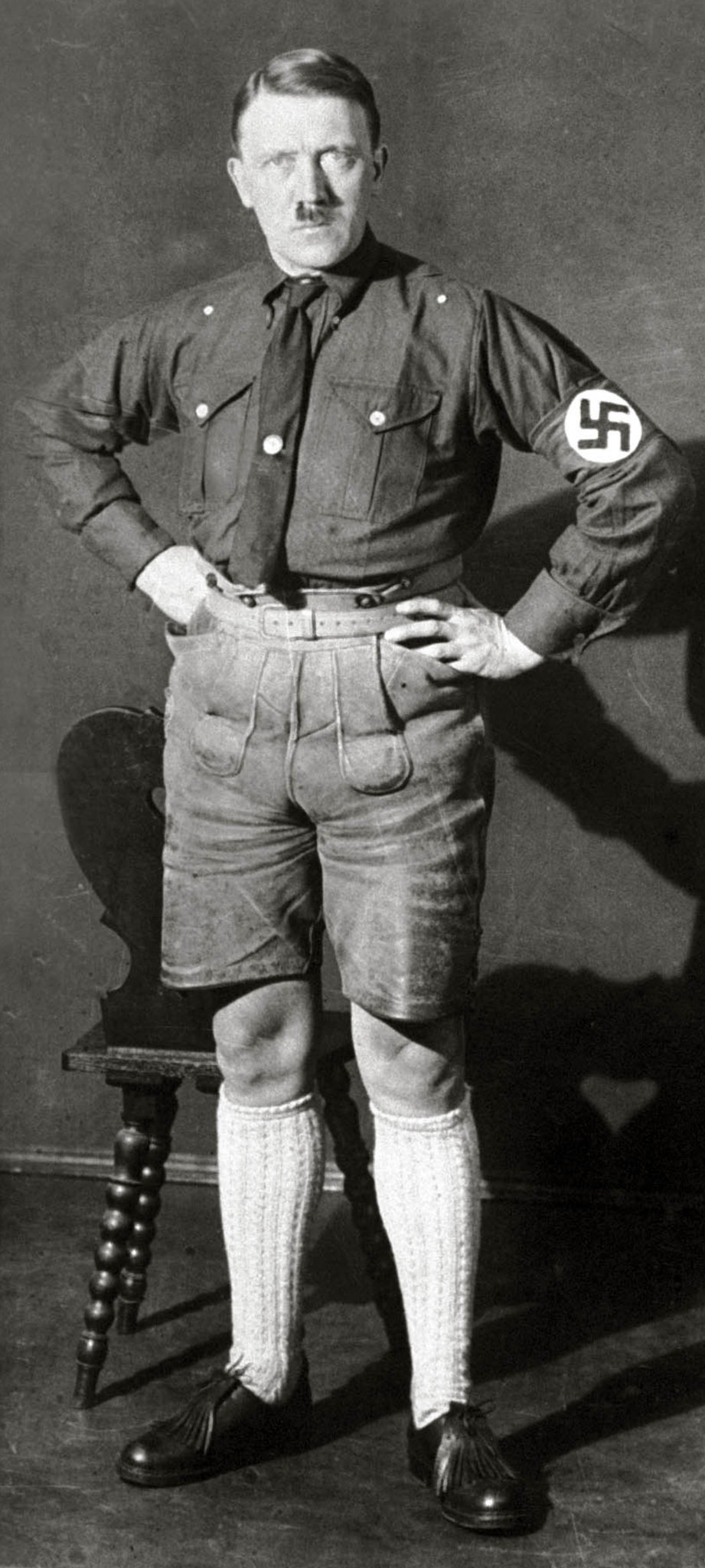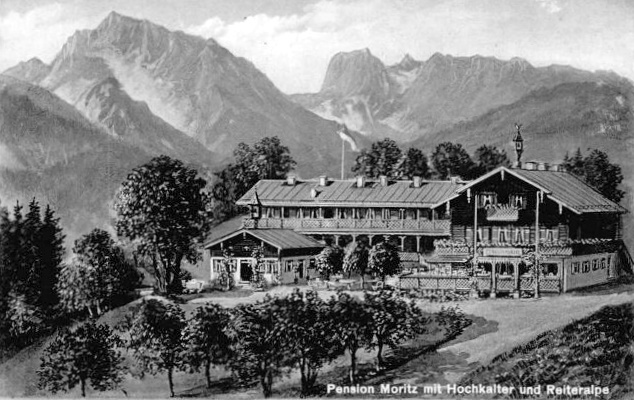 After the WWI defeat, Hitler returned to Germany and entered politics. When Hitler was an unknown plain-clothed army intelligence agent he met the plain-clothed Army Intelligence officer Ernst Roehm (1919). Soon after, Roehm became the flamboyant gay Army Captain and leader of the Freikorps, the right wing’s shadow army, but not without British help. Roehm immediately recognized how talented Hitler was, so they built a very close relationship at that time.
After the WWI defeat, Hitler returned to Germany and entered politics. When Hitler was an unknown plain-clothed army intelligence agent he met the plain-clothed Army Intelligence officer Ernst Roehm (1919). Soon after, Roehm became the flamboyant gay Army Captain and leader of the Freikorps, the right wing’s shadow army, but not without British help. Roehm immediately recognized how talented Hitler was, so they built a very close relationship at that time.
Roehm had access to Hitler’s WWI files and knew of Hitler’s sexual history. In this way, Roehm had control of Hitler and became his minder. Hitler was a sexual deviant who would do anything to hide his sexual proclivities from the public.
 This made him a puppet to any foreign country or ideology with the knowledge on him. This is known as the wood on a person and anyone with ‘the wood’ has control over that person.
This made him a puppet to any foreign country or ideology with the knowledge on him. This is known as the wood on a person and anyone with ‘the wood’ has control over that person.
Many of the highest-placed leaders in the Nazi party, including Hitler, Roehm, Forster, von Schirach, and almost all of his bodyguards were gay. Hitler surrounded himself with homosexuals and even retrieved Roehm from Bolivia, making him Deputy Führer. This knowledge enabled outside countries like Britain and ideologies like the Freemasons to control Hitler, his high command, and his bodyguards. Hitler and his band of merry bandits became puppets with wooden strings. In this way, any foreign society can be destroyed by a leader hiding their sexuality. Hitler, Roehm, Forster, and von Schirach took part in destroying their own societies while enjoying the power it gave them. Hitler was a double agent prime minister. He worked for a foreign country (Britain) and a foreign ideology (the Freemasons). The formula proved so effective it is still used today, in politics and the media, especially with TV personalities, radio announcers, prime ministers, and presidents, both male, and female.
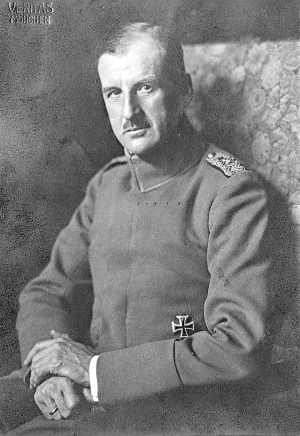 One of Germany’s more influential record keepers of Hitler’s homosexuality was Generalmajor Otto von Lossow, who was then the Military Commander of Munich. He was a very strong man in Europe in the early 1920s, had access to every record, and was a bitter enemy of Hitler. After dinner one night, he invited friends to his study and read secret letters from the Munich Beard Vice Squad to some of his dinner guests (‘Beard’ is German slang for ‘homosexual’). These dealt with Hitler in the early 1920s, searching for young men, occasionally paying them, and taking them to his room and spending the night together. Some of Hitler’s close friends gave testimonies that he was gay. ‘I, Franz, an apprentice, made the acquaintance of a gentleman who invited me to spend the night with him, and I accepted. The gentleman’s name was Adolf Hitler’. The originals have never been found. Von Lossow claimed they were his insurance policy should his enemy Hitler ever come to power. Lossow was the only one of Hitler’s enemies who was not killed in the Night of the Long Knives (June 30, 1934), which gives much credence to these files.
One of Germany’s more influential record keepers of Hitler’s homosexuality was Generalmajor Otto von Lossow, who was then the Military Commander of Munich. He was a very strong man in Europe in the early 1920s, had access to every record, and was a bitter enemy of Hitler. After dinner one night, he invited friends to his study and read secret letters from the Munich Beard Vice Squad to some of his dinner guests (‘Beard’ is German slang for ‘homosexual’). These dealt with Hitler in the early 1920s, searching for young men, occasionally paying them, and taking them to his room and spending the night together. Some of Hitler’s close friends gave testimonies that he was gay. ‘I, Franz, an apprentice, made the acquaintance of a gentleman who invited me to spend the night with him, and I accepted. The gentleman’s name was Adolf Hitler’. The originals have never been found. Von Lossow claimed they were his insurance policy should his enemy Hitler ever come to power. Lossow was the only one of Hitler’s enemies who was not killed in the Night of the Long Knives (June 30, 1934), which gives much credence to these files.
Hitler and Hess shared a cell at the Landsberg Prison after the Munich Putsch in 1923. Hess was always regarded as a homosexual by the enemies of the Nazi Party and by the Nazi Party themselves, who nicknamed him Fraulein Anna. Ernst Hanfstaengl later testified that Hitler and Hess were prison lovers and that Hitler’s strange wavering sexuality – bisexual – was activated in Landsberg in the company of Hess. That he had a liaison with Hess is beyond doubt’. Rudolf Hess had the upbringing a bisexual. He was born and raised in a foreign country under foreign rule (British rule) until he was 12. During his emerging sexuality (12-14) he was home-schooled by his parents in Germany and spent his time alone in a garden paradise. He became passionate and introverted, was a typically Victorian child (seen but not heard), and was nicknamed ‘the Egyptian’ for his oily skin and black hair. He loved his mother very much but was very distant from his father. He was sent to a boarding school at 14 (Evangelische Padagogium in Bad Godesberg-am-Rhein) and then to a superior school in a foreign country (Ecole Superieure du Commerce in Neuchatel Switzerland). He spent his life apart from other children, separate from his biological parents and separate from the country of his culture. He was an outsider who had an isolated psyche with a vicious inner dialogue that kept him alive and foreigners dead. On his return to Germany, he learned to hate the Jews with an introverted passion.
 Beer Hall Putsch – On the morning of November 8, 1923, Hitler gave Alfred Rosenberg, the editor of the National Socialist Party newspaper, an assignment. Rosenberg was to publish a special edition of the Volkischer Beobachter alerting the foreign press that something, what exactly, was not to be made clear, important was going to happen that evening at the Burgerbrau Beer Hall, a mile from Munich city center. Hitler told Rosenberg to be at the beer hall at 0700. Bring your pistol, he told Rosenberg, the moment for action has come.
Beer Hall Putsch – On the morning of November 8, 1923, Hitler gave Alfred Rosenberg, the editor of the National Socialist Party newspaper, an assignment. Rosenberg was to publish a special edition of the Volkischer Beobachter alerting the foreign press that something, what exactly, was not to be made clear, important was going to happen that evening at the Burgerbrau Beer Hall, a mile from Munich city center. Hitler told Rosenberg to be at the beer hall at 0700. Bring your pistol, he told Rosenberg, the moment for action has come.
By 0800, a crowd of about 3000 filled the beer hall and spilled out into the street. A red Benz pulled up at the entrance. Hitler exited the vehicle, pushed his way through a yelling crowd, and marched into the hall. In the banquet hall, a brass band was playing oompah music and waitresses carrying beer steins swept through tables—tables around which sat many of Bavaria’s leading politicians and business elite. The scheduled speaker for the night was to be Bavaria’s general state commissioner, Gustav von Kahr, who was to give what had been billed as an important talk. He arrived late and gave a dry speech about the evils of Marxism. Hitler, Rosenberg, and other supporters watched, unimpressed, from a vestibule. Meanwhile, outside the hall, a small army of about 125 men (Hitler Assault Squad), was being handed rifles, machine guns, and hand grenades by the unit’s commander, Josef Berchtold. Next to him, wearing a steel helmet adorned with a swastika, was a German war hero and the leader of Hitler’s protection force of roughnecks called the Storm Troopers, Hermann Goering. Berchtold and Goering ordered the men onto four flatbed trucks. The trucks drove up to the front entrance of the beer hall. Goering and about two dozen men strode quickly into the hall shouting Heil Hitler! A hundred or so other men scurried about the hall, covering the window, grabbing telephones, blocking exits, and assuming positions along walls.
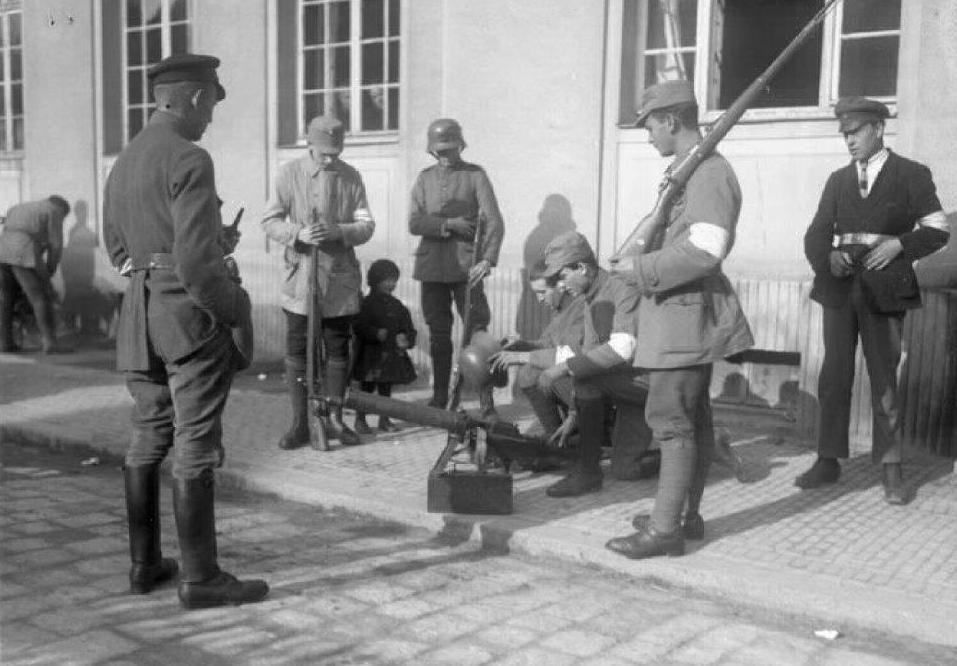 Hitler took a final slug of beer and marched into the banquet room. He jumped up on a table, pulled out a pistol, and fired two shots into the ceiling. Silence! he yelled. Then Hitler and several supporters pushed their way to the front of the room and confronted speaker Kahr at the podium. Storm Troopers pointed a machine gun at the crowd. Many who were in the audience said later that they suspected they were about to witness an assassination. Hitler shouted to the crowd, the national revolution has begun! Six hundred armed men are occupying this hall. No one may leave. The governments of Bavaria and Berlin have been overthrown! Army barracks and police headquarters are now under the control of his party! None of this was true, but Hitler hoped and expected that it would be soon enough.
Hitler took a final slug of beer and marched into the banquet room. He jumped up on a table, pulled out a pistol, and fired two shots into the ceiling. Silence! he yelled. Then Hitler and several supporters pushed their way to the front of the room and confronted speaker Kahr at the podium. Storm Troopers pointed a machine gun at the crowd. Many who were in the audience said later that they suspected they were about to witness an assassination. Hitler shouted to the crowd, the national revolution has begun! Six hundred armed men are occupying this hall. No one may leave. The governments of Bavaria and Berlin have been overthrown! Army barracks and police headquarters are now under the control of his party! None of this was true, but Hitler hoped and expected that it would be soon enough.
Hitler then told Kahr and two other important political leaders, Gen von Lossow and Col von Seisser, that they should join him in a side room for a conversation about Bavaria’s future. After the men leave, Goering told the crowd, You all have your beer. Keep drinking! You have nothing to worry about! In the side room, Hitler told the leaders that they had a choice. They could join his effort or they could die with him. He told the men his gun had four bullets, one for each of them and one for himself. If I am not victorious by tomorrow afternoon, I am a dead man, he said. And then he pointed the gun at his own head. After this disturbing demonstration, Hitler suddenly walked out of the room and into the banquet hall. He had an idea. Hitler told the anxious crowd that his revolution was aimed at Berlin, not Kahr’s regime in Bavaria. He won over the audience, turning them inside out like a glove according to one observer. They began to cheer and stomp their approval of Hitler’s plan to begin a march on Berlin.
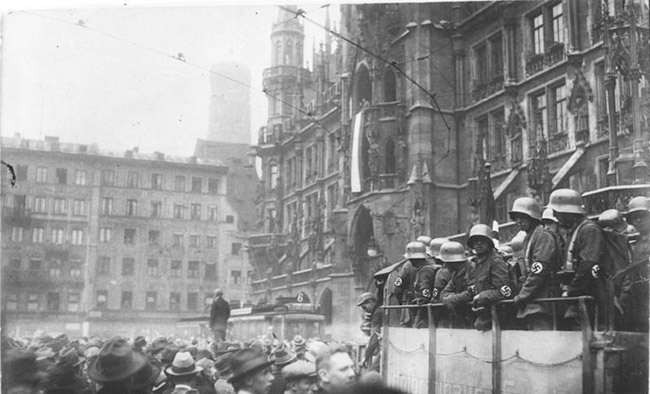 Hitler returned to his hostages in the side room. He told them the people are on his side; they needed to commit to the revolution. And now he had another card to play, with the arrival in the room of celebrated war hero Gen Erich Ludendorff, who had been successfully recruited to join his revolution. Ludendorff told Kahr, Lossow, and Seisser that they needed to steep and join the great national cause. Kahr replied (though he later denied it), Your Excellency’s wishes are my orders. Hitler brought Ludendorff and the three Bavarian leaders into the hall. They shook hands. Hitler announced that the new provisional government would the next day organize a march on Berlin, that sink of iniquity. Shouts of Heil Hitler! rang out from the crowd—and then a lively rendition of the national anthem, Deutschland, Deutschland Uber Alles.
Hitler returned to his hostages in the side room. He told them the people are on his side; they needed to commit to the revolution. And now he had another card to play, with the arrival in the room of celebrated war hero Gen Erich Ludendorff, who had been successfully recruited to join his revolution. Ludendorff told Kahr, Lossow, and Seisser that they needed to steep and join the great national cause. Kahr replied (though he later denied it), Your Excellency’s wishes are my orders. Hitler brought Ludendorff and the three Bavarian leaders into the hall. They shook hands. Hitler announced that the new provisional government would the next day organize a march on Berlin, that sink of iniquity. Shouts of Heil Hitler! rang out from the crowd—and then a lively rendition of the national anthem, Deutschland, Deutschland Uber Alles.
But the revolution would not happen, at least in 1923. Hitler’s biggest blunder was probably to leave the beer hall at about 1030 and go the Munich’s central train station. His purpose was to investigate a delay by a paramilitary unit in seizing the station to prevent, as one Hitler supporter put it, the rabble of racial alien Jews from the East from riding away at the last moment in a mad rush, loaded with foreign exchange. But, while he was away from the beer hall, Gen Ludendorff, made the critical mistake of releasing the three Bavarian leaders, based on their pledge of loyalty to the cause. Once released, however, the leaders would launch a counter-putsch.
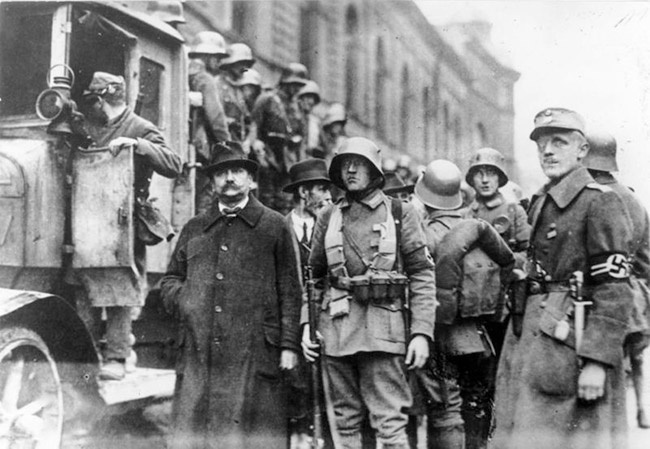 The next day, shortly before 0300, the three released Bavarian leaders ordered all Munich radio stations to broadcast an announcement: Generalkommissar von Kahr, Col von Seisser, and Gen von Lossow repudiate the Hitler Putsch. Expressions of support extracted at gunpoint are invalid. Kahr issued decrees declaring the Nazi Party illegal, confiscation of all Party property, and the arrest of Hitler, Ludendorff, and other key supporters on sight. Newspapers across Munich were ordered not to distribute morning papers on the punishment of death. (Bavarian leaders feared that news of their speeches at the beer hall would confuse the public into believing they supported the putsch.)
The next day, shortly before 0300, the three released Bavarian leaders ordered all Munich radio stations to broadcast an announcement: Generalkommissar von Kahr, Col von Seisser, and Gen von Lossow repudiate the Hitler Putsch. Expressions of support extracted at gunpoint are invalid. Kahr issued decrees declaring the Nazi Party illegal, confiscation of all Party property, and the arrest of Hitler, Ludendorff, and other key supporters on sight. Newspapers across Munich were ordered not to distribute morning papers on the punishment of death. (Bavarian leaders feared that news of their speeches at the beer hall would confuse the public into believing they supported the putsch.)
Hitler understood that the tide had turned against his planned revolution. He returned to the beer hall. A New York Times reporter described him as obviously overwrought and dead tired, a little man in an old waterproof coat with a revolver at his hip, unshaven, and with disordered hair. Things were desperate; government forces were retaking buildings captured by the putschists. But, tired as he was, he and Ludendorff came up with a last-ditch idea. They would leave the hall, march their supporters through the city, and urge citizens to join them. Hitler later would call it, the most desperately daring decision of my life. At about noon, the marchers left the beer hall and headed toward the city center, waving their swastika banner and singing their Nazi anthem. As they marched, sympathizers joined them. There was wild cheering from the crowds. Fifteen minutes into the march, they reached a bridge over the Isar River, where about thirty members of the state police, armed with machine guns, ordered them to stop. But Hitler’s troops charged, seizing guns and taking twenty-eight police officers captive. The marchers continued on across the bridge, and down narrow streets towards the center of Munich.
 With Ludendorff in command, about 2000 Nazis and supporters headed up Residenzstrasse, a narrow street that led into a major public square, the Odeonplatz (Odeon Square). A commander of a company of state police ordered the marchers to halt as they approached the square, but the marchers continued. And then came the shots; who fired first is a matter of dispute. Hitler had linked arms with another marcher, Max Scheubner, and when shots hit Scheubner, he fell dead to the ground, pulling Hitler with him. Hitler suffered a dislocated shoulder. Scheubner was struck by bullets in his lungs, chest, right arm, and both thighs. Goering was shot in his thigh and groin. When the firing stopped a minute later, twenty people lay dead in the streets, including fifteen marchers, four state police officers, and a waiter who just took the wrong time to cross the street to work. Another hundred or more people were wounded. The putsch was over – and the round-up of putschists began. (So did repairs; the owner of the beer hall sent a bill to the Nazi Party for 11.344.000.000.000 marks.)
With Ludendorff in command, about 2000 Nazis and supporters headed up Residenzstrasse, a narrow street that led into a major public square, the Odeonplatz (Odeon Square). A commander of a company of state police ordered the marchers to halt as they approached the square, but the marchers continued. And then came the shots; who fired first is a matter of dispute. Hitler had linked arms with another marcher, Max Scheubner, and when shots hit Scheubner, he fell dead to the ground, pulling Hitler with him. Hitler suffered a dislocated shoulder. Scheubner was struck by bullets in his lungs, chest, right arm, and both thighs. Goering was shot in his thigh and groin. When the firing stopped a minute later, twenty people lay dead in the streets, including fifteen marchers, four state police officers, and a waiter who just took the wrong time to cross the street to work. Another hundred or more people were wounded. The putsch was over – and the round-up of putschists began. (So did repairs; the owner of the beer hall sent a bill to the Nazi Party for 11.344.000.000.000 marks.)
Hitler had an exit plan and executed it. He had arranged for a doctor friend of his to have his yellow Fiat, with its motor running, parked nearby. After the shooting stopped, he ran to the Fiat and was driven to a villa of a friend in Uffing, some thirty-five miles south of Munich. From there, he hoped to escape to Austria. But before he could do so, on November 11, police surrounded the house. Hitler was discovered in the attic, wearing white pajamas and a blue bathrobe and his arm in a bandage. (Source: www.famous-trials.com)
Adolf Hitler’s sex life is dual as is his political outlook. He is both homosexual and heterosexual; both Socialist and fervent Nationalist; both man and woman. While the true Adolf Hitler is elusive to the diagnostician, there are certain facts that prove that his sexual situation is untenable and even desperate. There seem to be psychic if not also physical obstacles that make real and complete sexual fulfillment ever impossible. In general, what he seeks is half mother and half-sweetheart.
Since 1933 however, he also obtains esthetic satisfaction from, adolescent boys or girls. However; above all the dominant factor remains, which is frustrating, because of not finding the woman he needs in everyday life he has escaped into brooding isolation, and artificially dramatized public life. For example, obvious prostitutes barely admitted to the Kaiserhof Hotel were fervently admired by him provided that they appeared in couples or with a man. A solitary woman is usually ignored by him unless he is in a large crowd and can send an ADC to find out her identity.
He always wishes to be a spectator. ‘Do you know’, he once said to Dr. Sedgwick in 1923, ‘the audience at the circus is just like a woman. Someone who does not understand that the intrinsically feminine character of the mass will never be an effective speaker. Ask yourself what a woman expects from a man. Clearness, decision, power, action.
Like a woman, the masses fluctuate between extremes. What we want is to get the masses to act. This can obviously not be done with an appeal to their selfishness nor to their cowardice, but by an appeal to their, idealism, their courage, and their spirit of sacrifice. Who has more the spirit of sacrifice than a woman? If she is talked to properly she will be proud to sacrifice because no woman will ever feel that her life’s sacrifices have received their due fulfillment.
Once Dr. Sedgwick asked him: ‘Why don’t you marry and fool your enemies?’ Hitler answered: ‘Marriage is not for me and never will be. My only bride is my Motherland. Then seemingly with no sequence of ideas, he added: ‘There are two ways by which a man’s character may be judged, by the woman he marries, and then by the way he dies’. In 1923, when Dr. Sedgwick once playfully said: ‘If not a bride you ought to have a mistress’. Hitler replied: ‘Politics is a woman; he who loves her unhappily she bites off his head’. Sometime later while speaking of women Hitler occasionally quoted the Russian proverb. ‘If you go to a woman don’t forget your whip’.
This was said with the idea that man should be, the master of the erotic situation. Anyone who has ever seen Hitler talking in a bashful and puerile way to a woman would easily be led to believe that in marriage he would be the underdog, but that is manifestly wrong. It would seem that the whip plays some mysterious role in his relationship with women. In Dr. Sedgwick’s opinion, during almost fifteen years of association with Hitler, the whip with which Hitler loves to gesticulate figures as a kind of substitute or auxiliary symbol for his missing sexual potency. All this wielding of the whip seems to be connected with a hidden desire on the part of Hitler for some state of an erection that would overcome his fundamental sexual inferiority complex. The truth is that Hitler is in all probability still in the stage of puberty, and still in the essential meaning of the word a virgin. Whether Hitler’s habit of carrying and gesticulating with a whip, even while talking to a woman, is a memory residue of his whip-carrying, a sadistic father must be left an open question. It certainly forms a curious phenomenon that the ‘whip-motive’ occurs so frequently in Hitler’s erotic and political technique and that it links itself, consciously or unconsciously, with another of his complexes; ‘The Messiah-Complex’. What is meant will be seen from the following incident.
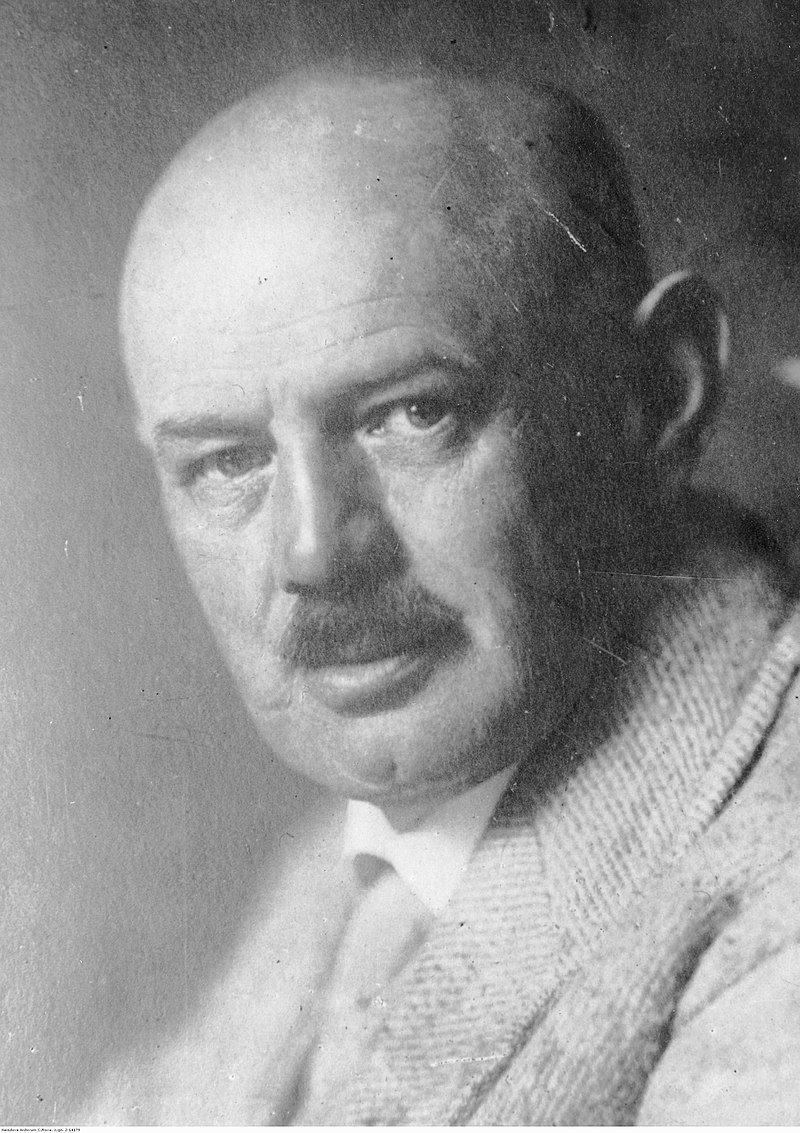 In June 1923, Dr. Sedgwick visited Berchtesgaden at Hitler’s invitation but at his own expense. At that time Hitler owned no house there but was staying at the Pension Moritz, whose Manager was Herr Buechner, a German flyer of World War I and who had a strikingly buxom six-foot-tall, blonde wife, which made her taller than Hitler. This rather vulgar, sensuous, blue-eyed woman had manifestly succeeded in completely inflaming Hitler to a degree that made him seem entirely beyond himself. His breath was short, his cheeks feverish, and his eyes filled with exaltation. In a swashbuckling manner, Hitler was strutting up and down the large veranda and garden, swinging his whip. He would stop now and again to talk to Frau Buechner, whip in hand, punctuating his sentences with the whip in a schoolboy fashion. He was obviously showing off talking at Frau Buechner and the numerous ‘gallery’ of admiring females, all Party adherents. He made, however, no impression on Frau Buechner. On and on he went, through the whole afternoon acting the desperado, the wild man, the man of destiny. The whole performance seemed hopelessly pubescent and empty.
In June 1923, Dr. Sedgwick visited Berchtesgaden at Hitler’s invitation but at his own expense. At that time Hitler owned no house there but was staying at the Pension Moritz, whose Manager was Herr Buechner, a German flyer of World War I and who had a strikingly buxom six-foot-tall, blonde wife, which made her taller than Hitler. This rather vulgar, sensuous, blue-eyed woman had manifestly succeeded in completely inflaming Hitler to a degree that made him seem entirely beyond himself. His breath was short, his cheeks feverish, and his eyes filled with exaltation. In a swashbuckling manner, Hitler was strutting up and down the large veranda and garden, swinging his whip. He would stop now and again to talk to Frau Buechner, whip in hand, punctuating his sentences with the whip in a schoolboy fashion. He was obviously showing off talking at Frau Buechner and the numerous ‘gallery’ of admiring females, all Party adherents. He made, however, no impression on Frau Buechner. On and on he went, through the whole afternoon acting the desperado, the wild man, the man of destiny. The whole performance seemed hopelessly pubescent and empty.
 Anton Drexler and his wife who were simple, nice people did not like this spectacle. Drexler was one of the founders of the Party and his wife was one of the most important women members. They thought it undignified and scandalous and especially so because Frau Buechner was a married woman which gave the whole thing an adulterous aspect. But there was another person, present, who also criticized Hitler, Dietrich Eckart, the poet. He was a fairly large, stoutish man with an impressive, bald head, small, twinkling eyes, a stentorian voice, and a soft Bavarian heart. He was entirely a man of the world and a free thinker but nonetheless was revolted by Hitler’s exhibitionism. It so happened that a shortage of rooms that night obliged him to share his room with Dr. Sedgwick. When they retired in the evening he poured forth the following: ‘You ought to have been here yesterday. You ought to have been here this morning. The way Adolf is carrying on now goes beyond me’. There’s nothing you can tell him anymore. The man is plainly crazy. Walking up and down with his whip, talking to that silly cow, Frau Buechner, he went so far as to describe his last visit to Berlin. Hitler said: ‘When I came to Berlin a few weeks ago and looked at the traffic in the Kurfuerstendamm, the luxury, the perversion, the iniquity, the wanton display, and the Jewish materialism disgusted me so thoroughly, that I was almost beside myself. I nearly imagined myself to be Jesus Christ when he came to his Father’s Temple and found …’
Anton Drexler and his wife who were simple, nice people did not like this spectacle. Drexler was one of the founders of the Party and his wife was one of the most important women members. They thought it undignified and scandalous and especially so because Frau Buechner was a married woman which gave the whole thing an adulterous aspect. But there was another person, present, who also criticized Hitler, Dietrich Eckart, the poet. He was a fairly large, stoutish man with an impressive, bald head, small, twinkling eyes, a stentorian voice, and a soft Bavarian heart. He was entirely a man of the world and a free thinker but nonetheless was revolted by Hitler’s exhibitionism. It so happened that a shortage of rooms that night obliged him to share his room with Dr. Sedgwick. When they retired in the evening he poured forth the following: ‘You ought to have been here yesterday. You ought to have been here this morning. The way Adolf is carrying on now goes beyond me’. There’s nothing you can tell him anymore. The man is plainly crazy. Walking up and down with his whip, talking to that silly cow, Frau Buechner, he went so far as to describe his last visit to Berlin. Hitler said: ‘When I came to Berlin a few weeks ago and looked at the traffic in the Kurfuerstendamm, the luxury, the perversion, the iniquity, the wanton display, and the Jewish materialism disgusted me so thoroughly, that I was almost beside myself. I nearly imagined myself to be Jesus Christ when he came to his Father’s Temple and found …’









